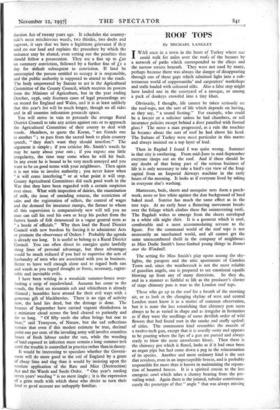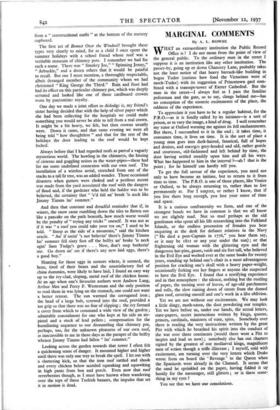ROOF TOPS
By MICHAEL LANGLEY
IWAS once in a town in the heart of Turkey where one could walk for miles over the roofs of the bazaars by a network of paths which corresponded to the alleys and the narrow streets beneath. They were not used by many, perhaps because there was always the danger of disappearing through one of those gaps which admitted light into a sub- terranean world of coppersmiths' and carpenters' workshops and stalls loaded with coloured silks. Also a false step might have landed one in the courtyard of a mosque, or among a pack of donkeys crowded into a tiny khan.
Obviously, I thought, life cannot be taken seriously on the roof-tops, not the sort of life which depends on having, as they say, " a sound footing." For example, who could be a lawyer or a solicitor unless he had chambers, or sell insurance policies except behind a door panelled with frosted glass ? The more a man progressed, as a rule the touchier he became about the sort of roof he had above his head. The Sultans of Turkey were most particular in this matter and always insisted on a top layer of lead.
Then in Bagdad I found I was quite wrong. Summer in that city is sweltering. From mid-June to mid-September everyone sleeps out on the roof. And if there should be any doubt of that being part of the serious business of life it is only necessary to take a bird's eye view of the Iraqi capital from an Imperial Airways machine in the early hours of the morning. It looks as if everyone lived by taking in everyone else's washing.
Mattresses, beds, sheets and mosquito nets form a patch- work, more or less white against the dun background of hard baked mud. Sunrise has much the same effect as in the tree tops. At an early hour a fluttering movement breaks over the foliage which clothes these flat uninteresting roofs. The Bagdadi wakes to emerge from the sheets enveloped in a white silk night shirt. It is a garment which is cool, comfortable and a most accommodating servant to the figure. For the communal world of the roof tops is not necessarily an unashamed world, and all cannot get the same unencumbered thrill in the company of neighbours as Miss Dodie Smith's loose-limbed young things 'in Bonnet over the Windmill.
The setting for Miss Smith's play opens among the sky- lights, the parapets and the attic apartments of Camden Town and, since the weathercock is not thc most reliable of guardian angels, one is prepared to see emotional squalls blowing up from any of many directions. So they do, and in a manner as faithful to life as the producer's cluster of stage chimney pots is true to the London roof tops.
Those who go up to the roof for a breath of the morning air, or to look at the changing skyline of west and central London must know it as a matter of common observation, but it is none the less astonishing that chimney pots seem always to be as varied in shape and as irregular in formation as if they were the seedlings of some devilish order of wild flowers that had found root in the smoke and stuffy updraft of cities. The commonest kind resembles the muzzle of a twelve-inch gun, except that it is usually sooty and appears to be pouting where the lips of a gun are pursed and always ready to blow the most unwelcome kisses. Then there is the chimney pot which is fluted, looks as if it had once been an organ pipe but had come down a peg in the reincarnation of its species. Another and more ordinary kind is the sort that revolves, even in an imperceptible breeze, and is probably responsible for more than it knows in maintaining the reputa- tion of haunted houses. It is a spirited cousin to the less energetic cowl which takes a clumsy bearing from the pre- vailing wind. Again there is the jointed, tubular contrivance, surely the prototype of that " angle " that was always missing from a " constructional outfit " at the bottom of the nursery cupboard.
The first act of Bonnet Over the Windmill brought these types very clearly to mind, for as a child I once spent the summer holidays with a school friend whose roof was a veritable museum of chimney pots. I remember we had for each a name. There was " Smokey Joe," " Spinning Jenny," " Arbuckle," and a dozen others that it would be painful to recall. But one I must mention, a thoroughly respectable, albeit deranged member of the community whom we had christened " King George the Third." Rain and frost had had its effect on this particular chimney pot, which was deeply serrated and looked like one of those cardboard crowns worn by pantomime royalty.
One day we made a joint effort to dislodge it, my friend's sister having decided that with the help of silver paper which she had been collecting for the hospitals we could make something you would never be able to tell from a real crown. It might be a bit heavy, we felt, but then crowns usually were. Down it came, and that same evening we were all being told " how thoughtless " and that for the rest of the holidays the door leading to the roof would be kept locked.
Always before that I had regarded roofs as part of a vaguely mysterious world. The howling in the chimneys, the hissing of cisterns and guggling noises in the water-pipes—these had for me some undefined connexion with our own roof. The installation of a wireless aerial, stretched from one of the stacks to a tall fir tree, was an added wonder. Those occasional disasters when gutters were choked and a perilous ascent was made from the yard associated the roof with the dangers of flood and, if the gardener who held the ladder was to be believed, the certainty that " 'e'd fall an' break 'is neck like Jimmy Timms las' summer."
And then that constant and dreadful reminder that if, in winter, the snow came rumbling down the tiles to flatten out like a pancake on the path beneath, how much worse would be the penalty of " trying any tricks " oneself. It was not as if it was " a roof you could take your tea on," I used to be told. " Steep as the side of a mountain," said the kitchen oracle. " An' if seein"s not believin' there's Jimmy Timms las' summer fell sixty foot off the belfry an' broke 'is neck agin' Sam Tudge's grave . . . Now, don't stop botherin' me. Go down an' see if there's any new laid eggs, there's a good boy."
Hunting for those eggs in corners where, it seemed, the hens, tired of their boxes and the unsatisfactory feel of china dummies, were likely to have laid, I found an easy way up to the ivy-clad, sloping, metal roof of the chicken house. At an age when one's favourite authors were Andrew Lang, Arthur Mee and Percy F. Westerman and the only position to read them in was lying on the stomach, one could not want a better retreat. The sun warmed the corrugated iron ; the head of a large bolt, screwed into the roof, provided a toe grip so that there was no fear of slipping ; the ivy formed a cover from which to command a wide view of the garden ; admirable concealment for one who kept at his side an air- pistol and a stock of lead pellets ; compensation for the humiliating sequence to our dismantling that chimney pot, perhaps, too, for the unknown pleasures of our own roof, as inaccessible to me in those days as the parapet of the belfry whence Jimmy Timms had fallen " las' summer."
Looking across the garden towards that tower I often felt a quickening sense of danger. It mounted higher and higher until there was only one way to break the spell. I let out with a shattering kick, so that the iron roof rattled and shook and every chicken below scuttled squeaking and squawking in high panic from box and perch. Even now that roof reverberates though, as I must have known when wandering over the tops of those Turkish bazaars, the impulse that set it in motion is dead.















































 Previous page
Previous page